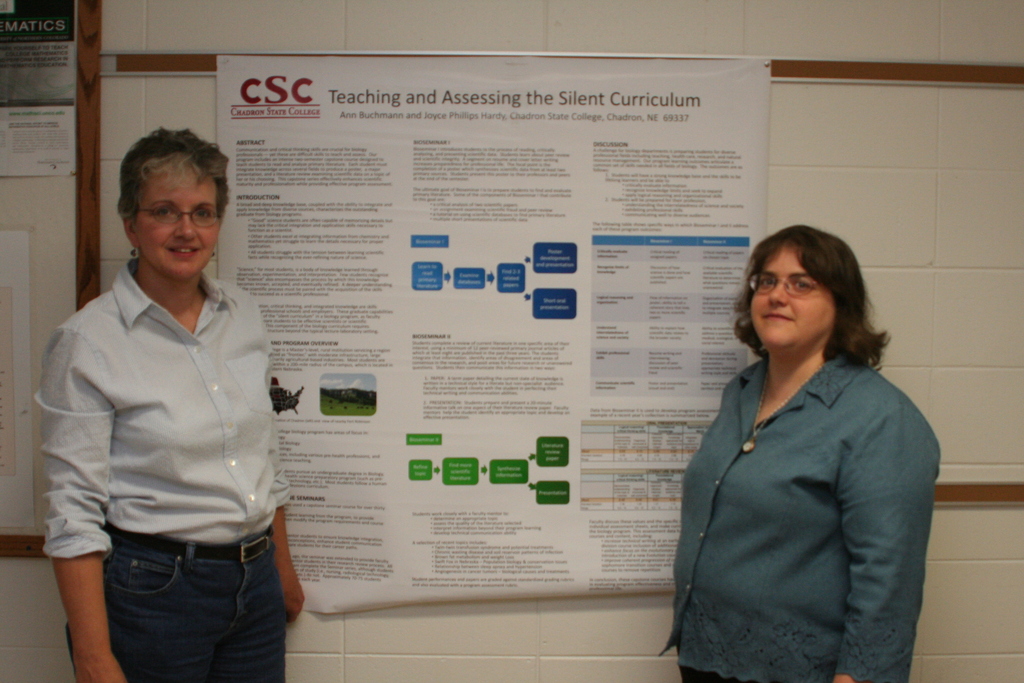Professors help improve teaching of biology

Two Chadron State College science professors were among the approximately 500 teachers, administrators and researchers who spent 2 ½ days in Washington, D.C., last month seeking ways to improve how biology is taught.
Dr. Joyce Hardy and Dr. Ann Buchmann were invited to the conference, which was titled “Transforming Undergraduate Education in Biology: Mobilizing the Community for Change.” Sponsors of the conference included the American Association for the Advancement of Science, the National Science Foundation, the National Institute of Health and the Howard Hughes Medical Institute.
“It was noted at the opening session that the biology of today is not your Grandfather’s biology, so it shouldn’t be taught the same way as it was taught years ago,” Hardy said. “Actually, we’re not teaching it the same way because so much technology is utilized.
“But because of the explosion of knowledge it Is certainly a challenge to cover everything the students need to know and then help them learn to use that knowledge whether they go into health care, research or field biology.”
Those attending the conference spent more than a third of the time divided into groups of about 25 to discuss various topics and then hammer out position statements. Hardy participated in the assessment sessions and Buchmann was assigned to the student-centered learning cadre.
Both CSC professors said their groups concluded it is important to provide many active learning experiences, or as Buchmann put it, “let students learn biology by doing biology.” But, both emphasized, while this sounds good, the students must be well-grounded in basic biological facts before they are able to master the hands-on activities.
“It’s a challenge for teachers to find a balance because students have to learn so many basic concepts before they are ready to begin problem-solving and conducting experiments that they would rather be doing,” Hardy said.
“My group also concluded that we aren’t making enough connections with other disciplines. When we determine how to do that it will increase the students’ ability to make use of the knowledge they have gained,” Hardy added.
Buchmann said developing critical thinkers also was a goal that grew out of her group discussions. Helping students communicate what they have learned and enabling them to put their knowledge into practice after they have graduated and are on the job or in graduate school also were major points of emphasis, Buchmann noted.
Buchmann also observed that as students become more “information savvy,” or familiar with technology, they also become more inpatient and want quicker results with they research problems or come in contact with information that is new to them.
The CSC professors said the group facilitators will draw up a list of conclusions from the work sessions and send them to the participants for their review. The final recommendations are expected by early in 2010.
In the meantime, Hardy and Buchmann plan to share their experiences at the conference with their nine colleagues in the Science Department at CSC.
Chadron State has approximately 400 biology majors. A vast majority of them are planning to enter the health professions.
“We push them hard,” Hardy said. “We want them to be highly successful wherever they go after they leave here. They have to be able to match or exceed the graduates of other colleges and universities.”
Hardy teaches chemistry and biology to freshman and also is in charge of the senior seminar, the capstone course for CSC science majors. Buchmann teaches microbiology. Both feel honored to have been invited to the conference in the Nation’s Capital because it included leaders in nearly every aspect of biology from across the country.
“I was exhausted after it was over,” Hardy said. “It was really intense.”
Prior to the conference, the CSC professors developed a large poster that was put on display there. The poster focused on the senior seminar, which Hardy said is designed to help the students pull together the information they have learned in their various science courses.
The seminar also helps the department members evaluate the effectiveness of their instruction and make changes if that seems necessary.
Category: Campus News
